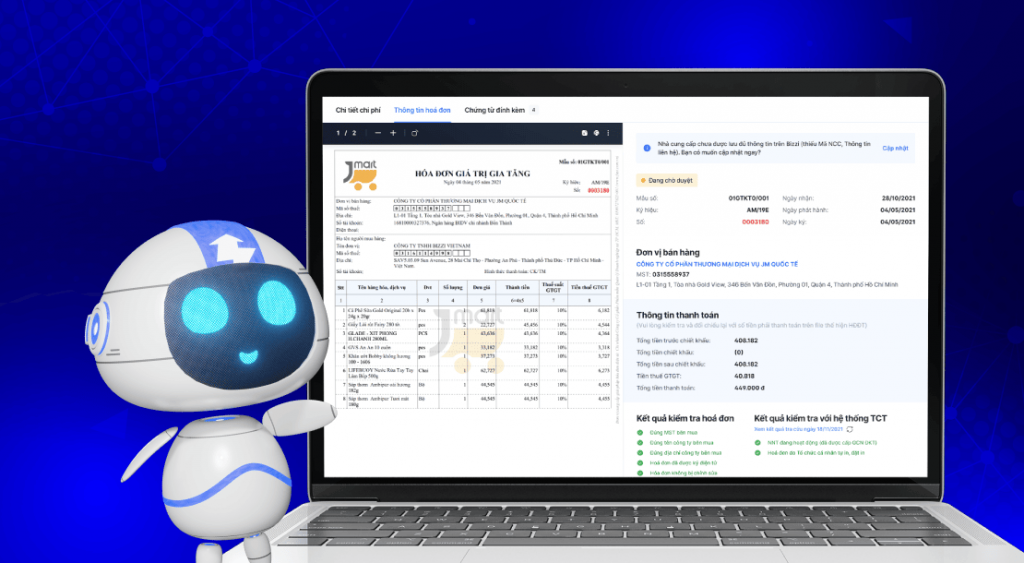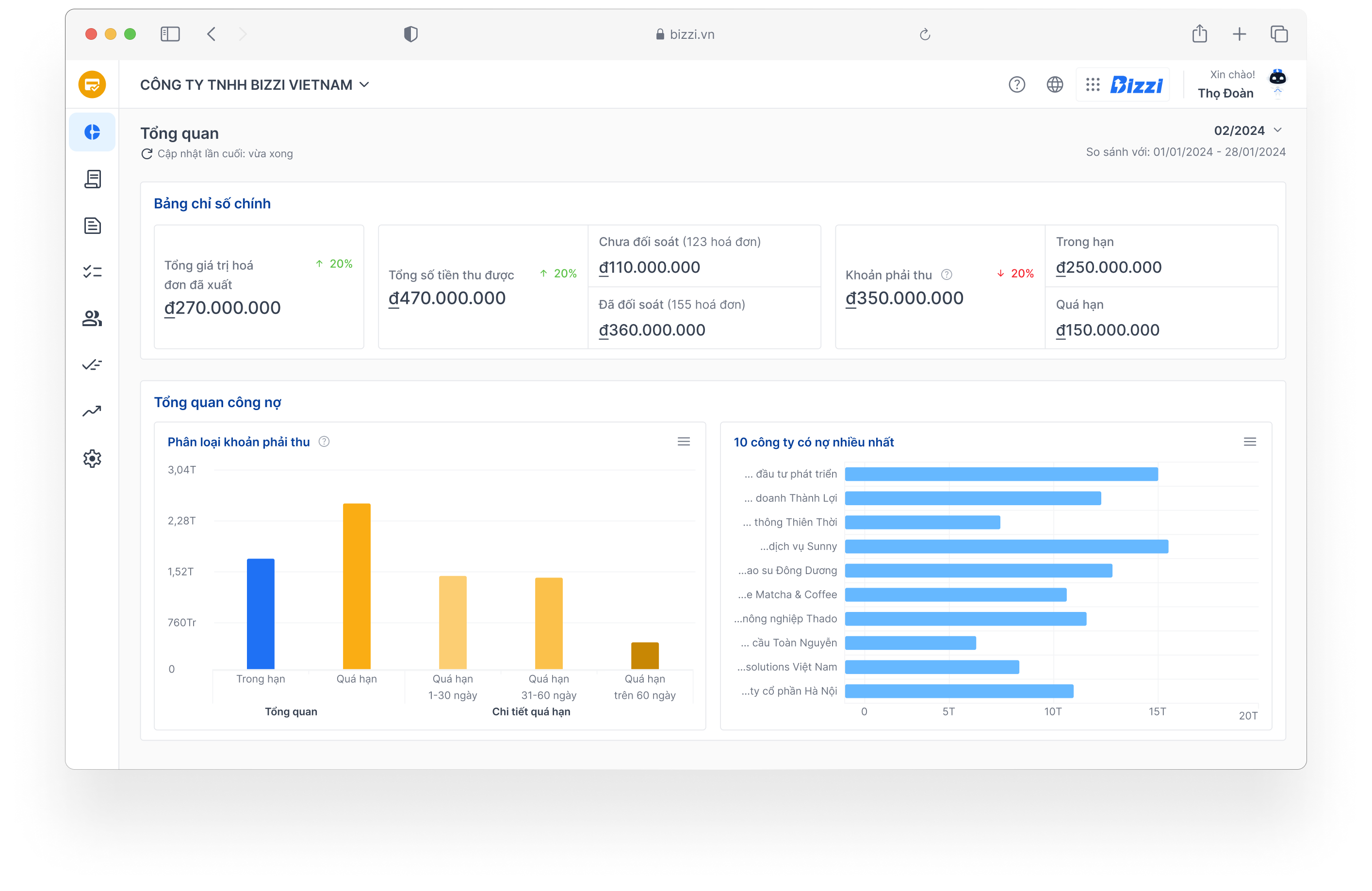Enterprise value not only reflects assets and profits but also demonstrates development potential and competitive strength in the market. So how is enterprise value determined? How to value accurately and appropriately for different purposes?
In this article, managers join Bizzi to explore the core factors affecting business value and the most popular valuation methods today.

1. Basic concepts
1.1 What is enterprise value?
Define: Enterprise value is the monetary expression of the income that the enterprise is expected to bring to investors in the future. It is measured by comparing the value of the enterprise's assets with the capital that investors have invested in the enterprise.
Core values: A company's core values are the beliefs, philosophies, and principles that drive its operations. These values support the company's vision and shape its culture, helping to ensure that all employees are working toward the same goals.
1.2 Factors that create business value
The value of a business is made up of many different elements, including both tangible and intangible assets.
- Tangible assets: includes machinery, equipment, real estate, buildings, offices, goods, and vehicles—elements that can be measured and priced specifically.
- Intangible assets: Patents, copyrights, brands, trademarks, business reputation and customer data are intangible assets that play an important role in creating competitive advantage and long-term value for businesses.
Human factors and cash flow are also core components that determine the value of a business. Human resources, from staff to experts and managers, directly affect the performance and sustainable development of the company. At the same time, cash flow from investment shares, stocks and bonds reflects the financial health, ability to mobilize capital as well as the growth potential of the business in the future.

Business value perspectives:
Enterprise value reflects the totality of tangible and intangible assets owned by the enterprise, as well as its ability to generate future profits. Determining enterprise value can be approached from two main perspectives: liquidation value and going concern value.
Liquidation value is the total amount of money that would be received if a business were to cease operations and sell all of its assets. Liquidation value is usually determined using the asset approach, which involves calculating the total value of the business's existing assets, then subtracting its liabilities and related expenses. This method is simple and straightforward, but is only suitable for businesses that have little or no chance of continuing operations in the future.
Going concern value reflects the ability of a business to continue operating and generating profits in the future. The discounted cash flow method is often used to determine this value, by forecasting the cash flows that the business will generate in the future and discounting them to a present value. This method is suitable for businesses with stable growth prospects and profitability.
Business value categories:
- Total enterprise value (V0): Value belongs to both creditors and owners.
- Owner's Enterprise Value (VE): Value belongs to the owner of the business.
Accurately determining the value of a business not only helps business owners and stakeholders understand the financial situation, but also assists in building development strategies, attracting investment and meeting current legal regulations.
2. Why is it necessary to determine business value?
Business valuation (valuation) plays an important role in many business and financial activities. Below are the main purposes of business valuation, divided by user groups:
Valuation purpose:
- Assets to secure bank/credit loans: Enterprises use the appraised value as collateral when borrowing capital from banks or credit institutions.
- Initial Public Offering (IPO): Determining enterprise value is the basis for pricing shares when offering them to the public.
- Report to shareholders and investors: Providing accurate information about corporate value helps shareholders and investors make informed decisions.
- Mergers and Acquisitions (M&A): Business valuation is an important step in the process of buying, selling, merging or consolidating a business.
- Divestment and division of corporate assets: Helps determine asset value when a business divests or divides assets.
- Tax settlement and audit reports: Ensure accuracy in financial reports and compliance with tax and auditing regulations.
- Restructuring businesses, improving competitiveness: Valuation helps businesses re-evaluate assets and performance, thereby developing strategies to improve and enhance competitiveness.
Business Administration:
- Assessment of scale, level of accumulation, production concentration and financial capacity: Help management better understand the financial situation and production capacity of the business.
- Make sound, effective business or financial decisions: Provide the information needed to support strategic decision making.
For investors:
- Evaluate the profitability or risk level of an investment: Investors rely on enterprise value to determine the attractiveness and risk of an investment.
- Assessment of financial capacity, business reputation and credit standing: Help investors better understand the financial health and reputation of the business in the market.
Legal requirements:
- Meet the mandatory requirements of the Law on Prices and the Law on Enterprises: Business valuation ensures compliance with relevant legal regulations.
Business valuation not only serves economic transactions but also helps businesses and stakeholders have a comprehensive view of the financial situation, thereby making appropriate strategic decisions.

3. Factors affecting business value
Determining the value of a business is a complex process and is influenced by many factors both external and internal to the business. Below are the main factors that influence the value of a business:
3.1 External factors of the business
Macro environment:
- Economy: Economic growth, interest rates, exchange rates and inflation all affect a business's profitability and cost of capital. For example, high interest rates can increase the cost of borrowing, while high inflation can affect consumers' purchasing power.
- Politics and law: Political stability and a transparent legal system facilitate business operations. Business support policies and the State's stance on production and business also play an important role.
Culture - society: Social concepts of ethics, aesthetics, lifestyle, customs and practices can influence consumer demand and a business's brand image. - Nature: Issues such as environmental pollution and waste of natural resources can affect production costs and business reputation.
- Technology: The advent of new technology can create a competitive advantage for a business or make existing products obsolete.
Industry environment:
- Industry business cycle and growth prospects: The industry's potential for market expansion and ability to improve its financial position directly affect the value of the business.
- Industry competition: The level of competition in terms of price and quality of products and services in the industry determines the profitability and market share of the business.
3.2 Internal factors of the enterprise
- Asset: Includes tangible and intangible assets necessary for the production and business process. The value and efficiency of asset use directly affect the profitability of the enterprise.
- Business location: Location, regional business environment and land size can affect a business's operating costs and ability to reach customers.
- Business reputation: External evaluations of a business's products and services influence its ability to attract and retain customers.
- Worker qualifications: The skill and craftsmanship of the workers determine the quality of the product and work efficiency.
- Business management capacity: The ability of the management team to plan, organize, coordinate, direct and control affects the performance of the business.
- Product consumption system network: Market share and market of domestic and foreign enterprises determine the ability to expand and grow revenue.
- Customer Relationship: The ability to attract and retain loyal customers affects a business's revenue and reputation.
- Business strategy: Product, price, distribution and sales support strategies determine the competitiveness and sustainable development of a business.
Recognizing and effectively managing the above factors will help businesses increase value and achieve sustainable development in a competitive business environment.

4. Business valuation methods
- Cost approach:
- Asset method: Enterprise value is determined through the total value of assets owned by the enterprise.
- Income Approach:
- Discounted cash flow method: Enterprise value is determined by converting future net cash flows to the valuation date.
- Discounted cash flow method.
- Dividend discount method.
- Discounted cash flow method of after-tax profit.
- Discounted cash flow method: Enterprise value is determined by converting future net cash flows to the valuation date.
- Market approach:
- Comparison method/Average ratio: Enterprise value is determined through the value of a business used to compare with the business to be valued.
5. Notes when appraising a business
Business valuation is an important process to determine the actual value of a business at a certain point in time. This process not only supports mergers and acquisitions but also helps businesses better understand their financial situation and future development direction. To accurately and effectively value a business, the following factors should be noted:
Valuation documents:
- Financial statements or audit reports from the previous 3-5 consecutive years: These reports provide an overview of the financial situation, business performance and profitability of the enterprise over the years.
- Certificate of business registration (BCR) or decision to establish a subsidiary: Prove the legality and right to operate of the business.
- List of fixed assets with legal documents of these assets: Includes information on ownership, value and current status of fixed assets such as machinery, equipment, real estate.
- Business performance reports for the last 3 – 5 years: Evaluate business performance, market share and implemented development strategies.
- Business organization chart (if any): Helps understand management structure, personnel allocation and internal operating procedures.
- Minutes of capital contribution, association, capital contribution to establish a company: Determine the ownership structure, rights and obligations of shareholders or capital contributors.
Important notes:
- Prepare full financial statements or audit reports for the last 3-5 years: Ensure continuity and accuracy of financial data, providing appraisers with a reliable basis for assessment.
- Prepare a complete list of fixed assets, intangible assets and related legal documents: This helps to accurately determine the value of the property, avoiding disputes or errors during the appraisal process.
- The appraiser needs to choose at least 2 valuation methods to determine the value of the business: The application of various methods such as asset method, cash flow discount method, average ratio method, etc. helps increase the accuracy and objectivity in appraisal results.
- Survey, research, and accurately analyze the market economic situation at the time of appraisal: Understanding the economic context, market trends and influencing factors helps make realistic assessments.
- Choose an independent, reputable valuation unit with a lot of experience in similar fields: Ensure objectivity, professionalism and reliability of appraisal results.

6. Valuation of micro, small and medium enterprises
Valuation of micro, small and medium enterprises (SMEs) is the process of determining the actual value of a business, based on factors such as assets, profitability and growth prospects. Accurate valuation helps businesses attract investment, borrow capital and plan effective business strategies.
Definition of micro, small and medium enterprises
According to Decree 80/2021/ND-CP, the criteria for determining SMEs are based on the number of employees participating in social insurance and total revenue or total capital, specifically:
Micro Enterprise:
Agriculture, forestry, fishery; industry and construction:
– Number of employees: no more than 10 people.
– Total revenue: not more than 3 billion VND or total capital not more than 3 billion VND.
Trade and service sector:
– Number of employees: no more than 10 people.
– Total revenue: not more than 10 billion VND or total capital not more than 3 billion VND.
Small Business:
Agriculture, forestry, fishery; industry and construction:
– Number of employees: from 11 to 100 people.
– Total revenue: not more than 50 billion VND or total capital not more than 20 billion VND.
Trade and service sector:
– Number of employees: from 11 to 50 people.
– Total revenue: not more than 100 billion VND or total capital not more than 50 billion VND.
Medium Enterprise:
Agriculture, forestry, fishery; industry and construction:
– Number of employees: from 101 to 200 people.
– Total revenue: not more than 200 billion VND or total capital not more than 100 billion VND.
Trade and service sector:
– Number of employees: from 51 to 100 people.
– Total revenue: not more than 300 billion VND or total capital not more than 100 billion VND.
Factors affecting business valuation
- Business environment:
- Macro environment: Factors such as economic, political, cultural and technological conditions directly affect the business operations of an enterprise. For example, a stable economy and supportive government policies will create favorable conditions for business development.
- Industry environment: The business cycle, growth prospects, and the level of competition in the industry all affect a company's profitability and value. Industries with high growth prospects and low competition tend to produce better business performance.
- Internal factors of the business:
- Property status: The value and quality of assets, including fixed and current assets, affect the production and service provision capacity of the enterprise.
- Business location: Convenient location helps businesses reach customers easily and reduce operating costs.
- Sales network: A widespread and effective distribution system helps businesses expand their market and increase revenue.
- Business strategy: A clear and feasible development plan helps businesses orient their operations and achieve their goals.
- Business Administration: Experienced and capable management team will make the right decisions, contributing to improving business efficiency.
- Human resources: A team of highly qualified and motivated employees is an important factor in helping a business develop sustainably.
- Technology: Applying modern technology helps businesses improve productivity, product quality and reduce production costs.
7. The value of corporate values
Core values of a business are not only a guideline for internal operations but also play an important role in shaping the brand and sustainable development. Below are the important benefits that corporate values bring:
The right decision
When a company clearly defines its core values, employees have a clearer direction in making decisions. These values help ensure that every choice, from business strategy to day-to-day operations, is aligned with the company's overall goals.
Effective communication
Corporate values act as a “common language” within an organization, helping to improve internal communication. When everyone understands and aligns with a consistent set of values, collaboration between departments and individuals becomes easier.
Motivation and engagement
A workplace with clear values will inspire employees and help them feel more meaningful in their work. When employees believe in the values of the company, they will be more motivated and willing to commit over the long term.
Understand the brand
Today’s customers are not only interested in products or services but also in the values and mission of the business. Building solid values helps customers better understand the brand and build long-term trust.
Attract potential customers
When a business’s values align with the views and beliefs of its customers, it is easier for them to attract loyal customers. These values help businesses connect more deeply with their target audience, creating a community of like-minded customers.
Retaining talent
A corporate culture built on strong values attracts employees who share the same mindset and vision. This helps businesses not only recruit talented people but also retain them over the long term.
Support marketing activities
Corporate values help marketing and communications departments easily orient content strategies, thereby building consistent brand messages that attract the attention of customers and partners.

How does Bizzi help increase business value?
Bizzi is a SaaS platform that helps businesses automate financial and accounting processes, improve management efficiency and optimize costs. Here's how Bizzi adds value to businesses:
Effective cost management
- Automate expense processing: Bizzi Expense – an expense management solution for businesses that helps minimize the time spent collecting documents and making payment requests, while automatically entering, checking and approving invoices, saving time and minimizing errors.
- Cost control by policy and budget: Bizzi Expense allows budgeting by department, project and spending category, alerts when expenses exceed budget, displays quick reports of spending information, and updates on estimated and actual spending centrally.

Optimize invoice processing
- Automate input invoice processing: Bizzi Bot loads, checks and reconciles invoices in a snap with AI-powered RPA (Robotic Process Automation) technology, reducing time by 80% at a cost of only 10% compared to manual processing.
- Electronic invoice: Bizzi provides B-Invoice electronic invoice solution, helping to reduce the cost of printing, storing and transporting invoices, while fully meeting business requirements according to tax regulations.

Debt control
- Track and reconcile debt: Bizzi helps track, reconcile debts and important indicators (number of days outstanding – DSO, debt aging report), helping to manage debts closely.
- Automatic debt reminder: Bizzi creates processes and automates scripted debt reminder tasks for each customer group via email and text messages, helping to improve debt collection capabilities.

Credit card management
- Business credit cards with integrated expense management: Bizzi cooperates with Visa and Shinhan Bank to launch a corporate credit card product with integrated cost management solutions, helping businesses control spending, avoid abuse and ensure compliance with company policies.
- Credit card transaction reconciliation: Bizzi tracks and reconciles credit card transactions, helping to detect errors or fraud.

Connect capital funding
- Supply chain finance: Bizzi connects capital sources to pay orders or invoices to suppliers with quick processes and procedures, competitive interest rates, helping businesses have more resources to develop.
- Working capital financing: Bizzi meets the capital needs of businesses without collateral with many diverse forms of funding.
With the above solutions, Bizzi helps businesses streamline processes, increase control and optimize business performance.
Thanks to powerful automation features and flexible integration, Bizzi not only helps businesses reduce the burden of financial and accounting management but also improves operational efficiency and expense control. By optimizing processes, improving cash flow and supporting funding, Bizzi becomes a trusted partner in the digital transformation journey, helping businesses develop sustainably and compete more strongly in the modern market.
Businesses can sign up for a trial of Bizzi Expense at:https://bizzi.vn/dang-ky-dung-thu/
Monitor Bizzi To quickly receive the latest information:
- Facebook: https://www.facebook.com/bizzivietnam
- Linkedin: https://www.linkedin.com/company/bizzi-vietnam
- Youtube: https://www.youtube.com/@bizzivietnam


